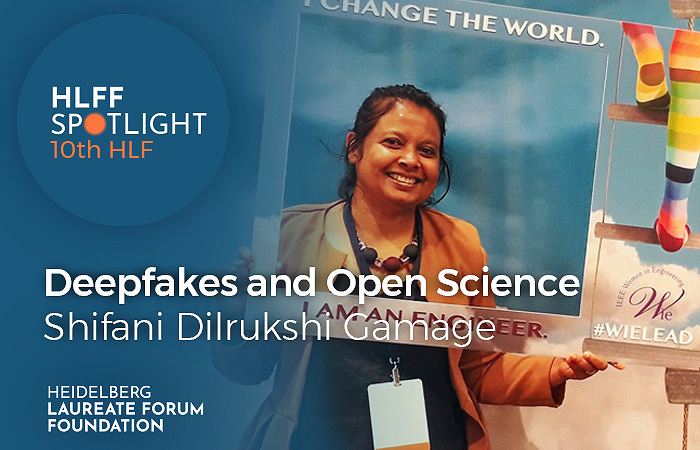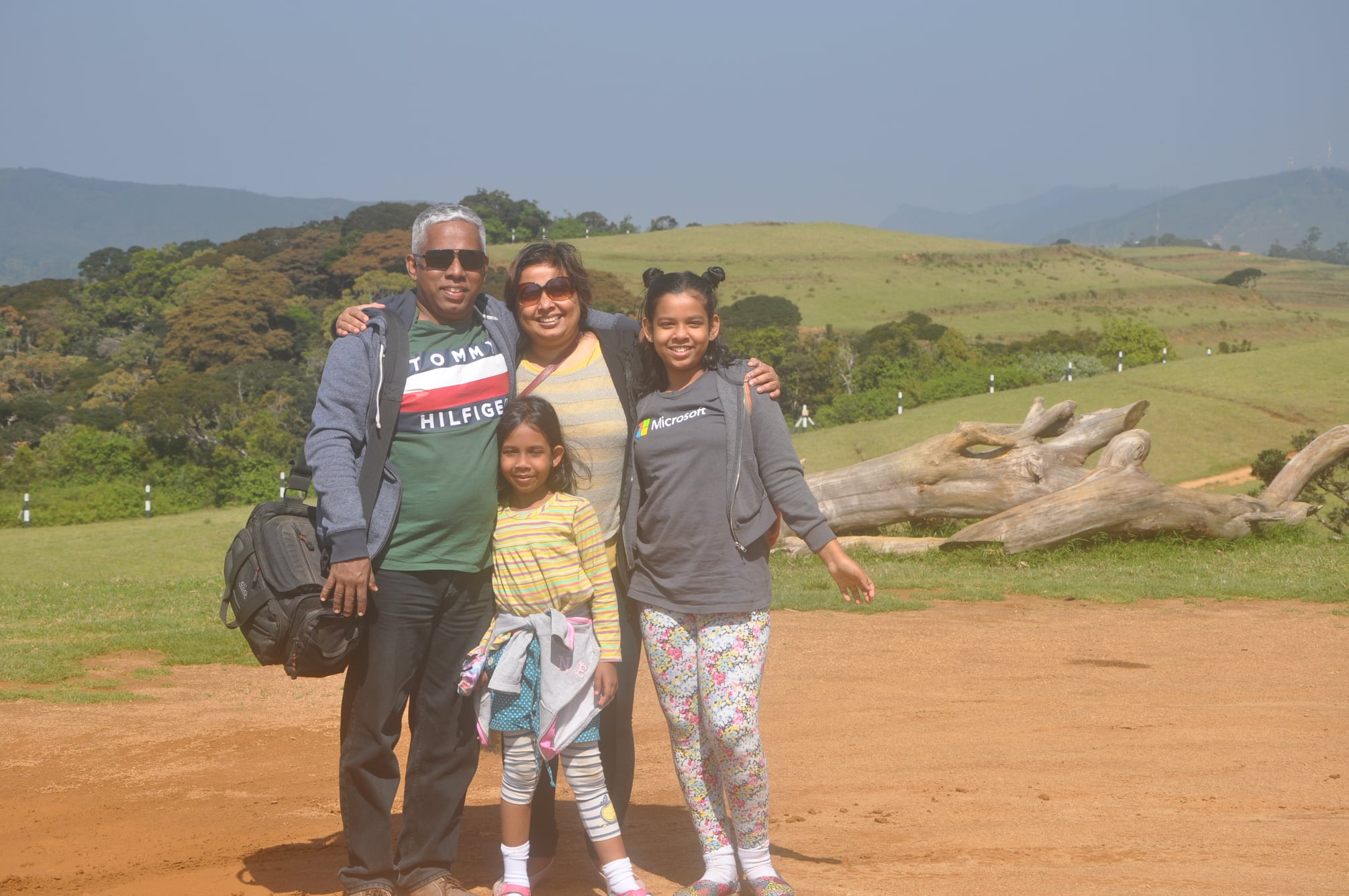HLFF Spotlight: 10th HLF
BLOG: Heidelberg Laureate Forum

Deepfakes and Open Science – Shifani Dilrukshi Gamage
The Heidelberg Laureate Forum has a single purpose: To provide some of the brightest minds in mathematics and computer science with the space and time to make connections and find inspiration. The HLFF Spotlight series shines a light on some of the brilliant young researchers attending the event, their background and research, as well as their expectations for the HLF.

Dilrukshi Gamage, a postdoctoral fellow from Sri Lanka who studies how society is influenced by technology, is already an HLF ‘veteran’. She attended the 5th HLF in 2017, midway through her PhD in Computer Science. Since then, she has carried with her the following advice offered by ACM A.M. Turing Award recipient and cryptologist, Martin Hellman: “The interesting thing in research is to be curious rather than furious.”
His words have since focused her while she weathered the logistical and administrative struggles that are typical of the career of an up-and-coming researcher, and one working in a field fraught with controversy and ethical dilemmas to boot. This includes studies not going to plan, and bracing oneself for the storm of reviewers who do not fully appreciate the value of such work.
“This mantra emphasizes to me the value of approaching challenges with an open, inquisitive mindset instead of becoming frustrated. It really encourages me to channel my energy more effectively into exploring, adapting, and collaborating. This has ultimately led to more meaningful discoveries and a positive research experience,” explains Dilrukshi, who in 2021 received her PhD from the University of Moratuwa in Sri Lanka.
Research Focus
As a postdoctoral fellow at the Tokyo Institute of Technology in Japan, she is now part of the research team of Kazutoshi Sasahara, an expert in computational social science and data analysis. Her current research is supported by the Japanese Science and Technology Agency (JST-CREST).
“Ethical considerations must be taken into account when adopting new technologies, in an effort to mitigate possible harm to society,” says Dilrukshi.
She studies how to better detect AI-generated images, soundbites, and deepfakes, as well as how to counter misinformation and disinformation. Her work includes finding ways to improve the discourse and landscape analysis around these topics through digital traces by incorporating tools and methodologies inherited from computational social science and human-computer interaction. This is done to track how society and its processes react to digital shenanigans. Dilrukshi also conducts quantitative and qualitative ethnographic and computational research on digital communities such as Reddit and Facebook, as well as on large-scale open learning communities such as Massive Open Online Courses (MOOCs).
For a recent presentation at the 8th International Conference on Computational Social Science (IC2S2 2022) in the USA, for example, Dilrukshi and a colleague analysed how people discuss deepfakes on social media sites like Twitter and Reddit. The word “deepfake” (which refers to the use of deep learning programmes to create fake images or sound) was first used on a Reddit forum in 2017, along with pornographic videos altered using machine learning algorithms. Deepfakes were also the topic of a chapter Dilrukshi was the lead author of in the book Frontiers of Fake Media Generation and Detection, published by Springer in 2021.
She worries that people too readily forward so-called “too good to be true” images or audio clips without checking their validity.
“It’s not that people don’t know how to find the truth. There are tools which can easily do so. It’s that people are not cognitively trained to think whether some content may be true or not, or do not have time to evaluate whether there is truth in it,” Dilrukshi explains.
Dilrukshi and others working on the project leverage human-computer interactions and computational social sciences to derive insights and design tools and technologies. They hope their analysis of data and trends will help the world stay one step ahead of criminals and pranksters. She is increasingly worried about how sophisticated AI-generated voice technology is becoming.
“AI-generated voice technology can make you say things that you never did, without a person listening on the other side of a phone even realising that it’s not you,” she explains, ever worried that especially elderly people might easily be fooled when for instance receiving fake voice notes asking for help from fake “family and friends”.
She foresees that people will increasingly have to become “old school” in their interactions with others again, and in important cases may gradually have to swap screen-based meetings for in-person interactions to counter the possibility of being conned.
The 10th HLF
Dilrukshi estimates that she had memorable chats with roughly 60% of young researchers attending the 5th HLF in 2017. She hopes to improve on her record in 2023.
She still fondly remembers swapping stories about Sri Lanka with British laureate Tony Hoare (the 1980 Turing Award recipient), who was born in Sri Lanka.
Dilrukshi says that going into her first HLF, she did not fully grasp how many opportunities to informally engage with laureates there would be on the programme.
“There were far fewer formalities than I expected,” she remembers. “It was really such a privilege to connect with the laureates of prizes in our field that are on par with the Nobel Prizes. It was fascinating to listen to their private stories, and to receive real-life advice about more than just academic matters.”
“What I learnt from their life stories was that none of them set out to become laureates. They had a vision and they had passion. And then something like prizes might come to you.”
The people-centred Dilrukshi hopes to have similar inspirational interactions when visiting Heidelberg this year, and to reconnect with laureates she met in 2017, such as Martin Hellman, Leslie Lamport, and Vinton Cerf. As a woman in science, she is eager to meet Yael Tauman Kalai, who in 2022 received the ACM Prize in Computing for her work in the field of cryptology.
“As a postdoc, I hope to receive advice from experienced researchers on career transitions and life hacks that will help me grow as a scientist and to conduct impactful research. Finally, as a Sri Lankan from the Global South, I hope to share my experiences and knowledge about the rich culture of my part of the island,” she adds.
Open Science
Dilrukshi believes in working in pursuit of a specific vision, as it provides purpose to one’s life. To this end, she is glad that she can through her scientific endeavours work towards a meaningful purpose, even if she only adds small bits of change to the greater whole.
She describes herself as “an advocate of open research, open science, open access, open data, and open education.” She is thankful that the availability of open resources, as well as collaborative, data driven, and web-based research efforts – not to mention online training opportunities – have allowed her to fulfil the multiple roles of an involved mother, an active, internationally engaged researcher, and an activist for women in science – all this mostly from her home base in Sri Lanka.
She lives in the town of Piliyandala with her two teenage daughters and husband, engineer Manodha Gamage, with whom she partners in a technology consultancy company. Because of COVID-19 regulations that were in place until recently, she was able to spend the greater part of her postdoctoral fellowship working from home.

“Open science practices empower me to be a hardworking, helpful and quality researcher who can make a meaningful contribution to the world,” says Dilrukshi, who is prepared to share all her data and methods based on the principles of open science.
During the first years of her PhD, she was, for instance, part of a crowdsourcing research project led by Michael Bernstein of Stanford University’s Human-Computer Interaction (HCI) Group. The team worked towards prototyping, designing, and experimenting with a scalable community-led open platform that gig worker communities could manage themselves.
She is currently an affiliate at the Berkman Klein Center for Internet & Society (BKC) at Harvard University, having been a participant in its Research Sprint since 2020. She is also involved in the Credibility Coalition, a research community that fosters collaborative approaches to understanding the veracity, quality, and credibility of online information to further civil society.
These online endeavours have subsequently opened doors to conferences and training opportunities elsewhere in the world, and she has therefore been able to visit countries such as Sweden, South Korea, the USA, the Netherlands, the UK, Italy, Germany, India, and Japan.
In 2021, Dilrukshi won the award for the best paper presented at an Asian CHI symposium that formed part of the endeavours of the annual ACM Conference on Human Factors in Computing Systems (CHI). It highlighted best practices on how to leverage a sense of community when following online MOOC training sessions. In this regard, Dilrukshi has plenty of personal experience, having already completed more than 50 MOOC topics on seven training platforms.
Motherhood
Dilrukshi only started working towards her PhD after the birth of her second daughter. She admits that the responsibilities of studying and being the mother of two children are challenging, even at the best of times. However, she sees it as an opportunity to inspire not only her own daughters, but also other young women who might be considering careers in the sciences or elsewhere. To this end, she has, for instance, served on committees in the Society of Learning Analytics Research (SoLAR) and the ACM Special Interest Group for Computer-Human Interaction (SIGCHI) focussed on matters of diversity and inclusion. She served on programme committees for the IEEE Women in Engineering (WIE) International Leadership Conferences from 2019 to 2021 and is involved in IEEE activities in Sri Lanka.
Through her interactions with the global SIGCHI, she also founded and chaired a chapter in Sri Lanka in 2019 to bring together researchers working in the field of human-computer interaction.
Dilrukshi shows that a woman in academia – and especially in the STEM fields – does not have to choose between motherhood or a research career. She believes one can be a researcher who is curious about life and work from the home front, yet still be taken seriously on the world stage.

